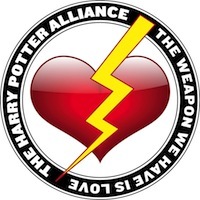Q&A: Turning fandom into political and social action
As the public’s faith in government and traditional political institutions crumbles, younger generations are taking cues from fictional wizards and TV vampires to take action on behalf of issues or causes they believe in.

Ashley Hinck
That phenomenon is at the heart of Ashley Hinck‘s research for her Ph.D. in the Department of Communication Arts. Her master’s thesis focused on the Harry Potter Alliance, a nonprofit organization with 85 chapters around the world that uses parallels from the popular books by J. K. Rowling for its activism in the real world. Since 2005, the alliance has organized more than 25 social justice campaigns on issues such as same-sex marriage, independent media, fair trade, and ending genocide.
But Harry Potter is not the exception: fan activism is happening at all levels. Followers of a YouTube channel called VlogBrothers branded themselves “Nerdfighters” and have loaned nearly $3 million to people in developing countries through the website Kiva.org. And young fans of the TV show “The Vampire Diaries” are taking part in environmental activism through a charity established by one of the show’s stars, Ian Somerhalder.
“I have more case studies than I know what to do with,” Hinck says.
Q: You are recruiting fans of all sorts to interview for your research — why are you looking at such an array of topics, from “The Vampire Diaries” to Nebraska football?
A: Part of what I wanted to do is look at a range of fandoms in terms of how mainstream or niche or underground they are. I wanted to make sure that this wasn’t just about nerd culture, that this is fandom really across the board, that fandom itself has huge potential.
All fandom has some kind of potential, but the football coach at Nebraska did a great job of creating a nonprofit. I could have just as easily done Badger football, but this nonprofit, in particular, does it to such an extreme level and produces such rich communication to look at, and has such a huge impact that it made it a really great case study.
Q: How did you end up studying Harry Potter fans?

A: My best friend in high school was a huge Harry Potter fan — the kind of super fan who goes to conventions. So she dragged me along and introduced me to the Harry Potter Alliance. I was a communication major as an undergrad and learning about persuasion, thinking about social movements, and I didn’t see the Harry Potter Alliance reflected in what I was learning. I thought, “Why is no one talking about this?”
Q: What have they done in terms of social action?
A: They’re doing really typical democratic kinds of things. They’re voting, they’re signing petitions, and they’re calling in and writing to their representatives. They are donating money, they are knocking on doors, and they’re doing those kinds of standard things — but because of Harry Potter, not because of the Democratic Party or the Republican Party or their church group.
One example is Darfur. Before it became really mainstream and widely known, they were trying to get the word out and pushing Congress to take action. They also worked on a marriage equality campaign in Maine and Massachusetts and Rhode Island. They worked with Mass Equality, which is a nonprofit that supports same-sex marriage, and as soon as the Harry Potter Alliance joined up with them, the number of phone calls they made in one day grew by 1,200 percent.
Fair trade is one of my favorite issues that they work on because the metaphor can be really short and concise — one of the main characters, Hermione, wants to free the house elves, and so fair trade is a way to think about becoming like Hermione: buying goods that are made with workers’ rights in mind.
“I’m working against the idea that super fans are weird, crazy loners. For these fans, it is very serious and it has really important implications for who they are as political subjects, as citizens.”
Ashley Hinck
Q: The perception in our culture is that people who are big fans of something are losers who don’t do anything — but this is the opposite of that.
A: In doing this research, I’m working against the idea that super fans are weird, crazy loners. For these fans, it is very serious and it has really important implications for who they are as political subjects, as citizens. I think that’s the really exciting part. But I will add, too, that I think fandom is shifting a little bit. In the last 20 years or so, geek culture, nerd culture has kind of risen and is much more mainstream, much more accepted than it ever was before.
People have always been fans of things, but organized fandom … it’s easier to hook up with other fans, too, because of the Internet. Fandom is just really motivating because it gives you a reason to connect to something, and then you can use that connection as a vehicle to get to other places. Once you care about fandom, whatever that fandom is, I think that offers a pathway to lots of other things. That deep connection is powerful.




